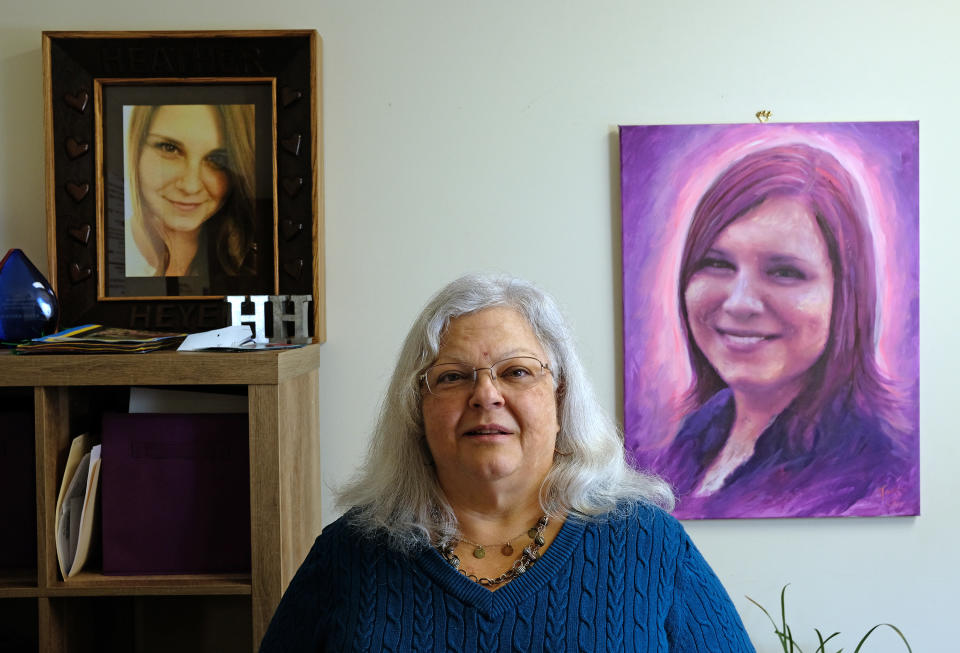How Heather Heyer's mother keeps her legacy alive
The following is an excerpt from our project Charlottesville: One Year Later. Yahoo News spoke to over a dozen people connected to the deadly August 2017 rally about how things have changed over the past 12 months. To read the rest of their stories, click here.
It’s been more than 11 months since the funeral, and Heather Heyer’s mother isn’t sure where her daughter’s phone is.
“Did we ever get that back, honey?” Susan Bro asks her husband in their northern Virginia home in late July. “We got a bunch of her other stuff, but my understanding is it was all she had in her pocket. Somebody somewhere has her phone. The police say they don’t have it. We don’t know who has it.”
It’s one of the few details she’s not on top of. Bro has spent the past year traveling the country to promote a memorial foundation, launched within days of Heyer’s death, to promote her daughter’s legacy of opposition to racism — and to help her cope with an unthinkable loss.
She says she was encouraged by mothers of victims of the Pulse nightclub shooting, who launched foundations in honor of their children.
“Watching them gave me an understanding that doing something in honor of your child that is truly a worthwhile thing, not just planting a flower bed or something but trying to help others,” Bro says. “Actually, it not only lends a good memory to your child in the public’s eye, but it also helps tremendously with the healing process.”

That process has included surreal moments, like Bro’s appearances on the “Ellen” show and the MTV Music Awards — something she says would have mortified Heather.
And it includes her public shunning of President Trump. Bro says the White House tried to contact her three times on the day of Heyer’s funeral.
“My phone was turned off that entire day,” she recalls. “By the time I turned it on it was like 10:30, and then I sat down and watched the news and heard he said there were ‘good people on both sides,’ and I said, ‘Screw that. I’m not talking to him.’”
Bro’s willingness to speak out on behalf of her daughter, and against the president, has also put her in the crosshairs of conspiracy theorists who allege, among other things, that Heyer died of heart failure, not in the car attack, or that Bro herself is a crisis actor.
“Yeah, that was the first one,” she says. “That’s one they always try.”
But they haven’t deterred her. As the first anniversary of her daughter’s death approaches, Bro is focused on the foundation — the endowment is approaching $250,000 — and on a book she is writing about the conversations she had with Heyer.
She’s also attempting to carry on Heyer’s legacy by encouraging people to become active in the face of injustice. She quotes her daughter: “If you’re not outraged, you’re not paying attention.”
“We have to have a lot of difficult conversations with people that we would not normally want to have conversations with,” she says. “And be willing to listen to what they’re saying, think about it and then respond. You don’t need to respond immediately. You don’t need to respond with hate. You don’t need to respond defensively. You need to respond rationally, and I think that’s what’s gonna move the country forward.
“We’re not gonna agree with everybody,” Bro continues. “I will never agree with white supremacy. I will never agree with the Nazis or the KKK. But I do hear what they’re saying. Their fears of being a minority tell me that they understand that minorities are not well treated in this country, so maybe they really need to focus their energy on seeing that minorities are better treated, if they’re afraid of becoming a minority.”
On Aug. 12, Bro is planning to lay flowers on the spot on Fourth Street where Heyer died. She’s also scheduled to speak at an NAACP event that evening.
“This is the last of the first,” Bro says. “The first year a loved one passes, you experience the first birthday that they missed, the first family dinner that they’ve missed, and so forth and so on. So this will be the last of the first. And I’m not looking forward to it, but I will survive it. It is survivable, and I will continue forward. That’s what I do. That’s how my family approaches death. You don’t get to pick who dies, when they die or how they die. People around you that you love are gonna die, and you cope with it and you move forward.”
_____
Read more from Yahoo News on Charlottesville, one year later:
New Charlottesville mayor vows to keep pushing ‘until it’s done right’
Vice News journalist on what it’s like to be recognized by Nazis
‘Cryin’ Nazi’ blames rally organizer for Charlottesville ‘catastrophe’
Charlottesville photographer would return Pulitzer if he could save Heather
Former Virginia governor remembers troopers who died in Charlottesville
Trump’s ‘both sides’ response to Charlottesville still elicits anger



